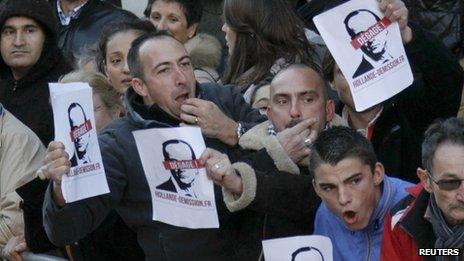France: A troubled Republic
- Published
- comments

Catcalls have sounded out even at Armistice events
Watch France. Its mood is fractious. President Francois Hollande has the lowest approval rating of any president since the founding of the Fifth Republic 55 years ago.
There is an incipient taxpayer's revolt. There are 3.3 million people out of work. Growth is anaemic and France's credit rating has just been downgraded for the second time in two years. In Brussels and Berlin, it is the country which worries officials and politicians more than any other in Europe.
Yesterday President Hollande was booed on the Champs Elysees. The occasion was a solemn event to remember the fallen from World War One. That did not stop cries of "Hollande resign" and "Socialist dictatorship" from a small group of protestors.
The interruptions, which were resented by most in the crowd, reflect a rebellious mood in France. The protests have been widely condemned in France, but a former defence minister under the last President, Nicolas Sarkozy, whilst condemning the protests, added that "the anger of the French people is immense" and saying "there is a pre-insurrectional mood in the country".
Fiscal dilemma
The strain is showing. Francois Hollande twists and turns as he tries to reduce the budget deficit while resisting cutting public spending, which is the highest in Europe. Here is his dilemma: he fears that reducing spending, embracing far-reaching pension reforms or freeing up the labour market will bring his natural supporters onto the streets in anger. So he has favoured increasing taxes rather than spending cuts.
There are signs of a spreading taxpayer's revolt. Last month thousands of taxpayers in Brittany took to the streets wearing "bonnets rouges". They drew their inspiration from the famous Red Bonnet revolt in the 17th Century against tax rises.
What prompted this was opposition to a green tax on trucks from January. It provoked farmers, small businessmen and workers from the mass food production industry to take direct action against the technology to be used in the scheme.
The French farmers angry at rising haulage costs
Two dozen of the new motorway toll sensors have been destroyed and a gantry to monitor truck movements has been burned. The government has, for the time being, suspended the tax but it was intended to raise 1.5bn euros (£1.25bn) - a key element in trying to reduce France's budget.
The tax "revolt" has spread to cities like Lyon and Marseille. There are planned protests against a rise in VAT scheduled for January. Others are fighting paying a tax on overtime on which many workers depend. Even football clubs are threatening action because players object to paying 75% on earnings above a million euros.
France at 'limit'
President Hollande is also feeling the squeeze from Brussels. France has already been given an extra two years, until 2015, to reach a deficit of 3%. The EU Commission doubts France will meet that target.
The EU Commission President Jose Manuel Barroso is now openly outspoken in his message to France.
"The fiscal policy in France has reached its limit of acceptability," he said. "France is by far the country [in the EU] where companies pay the highest taxes and that's a problem for growth and employment."
The Commission president wants public spending reduced instead.
The Commission is predicting growth of 0.9% next year, but both France and the rest of the eurozone needs much higher growth than that. The government in Paris argues that it has implemented tax breaks for small businesses and that wage negotiations have become more flexible but the president, like never before, is under growing pressure to turn France around.
In these difficult times the far-right Front National of Marine Le Pen is gaining in the polls. One poll put the party on 28%, the same as the Socialists. Another poll puts the Front National out in front when voters are asked about the European elections next year.
From tomorrow, the European Commission on the EU economies and their budget programmes. Particular attention will be focused on France.